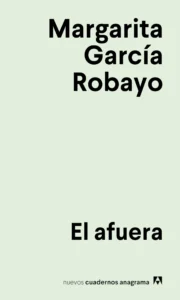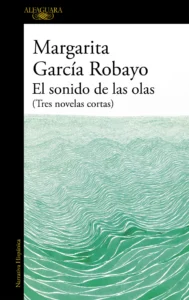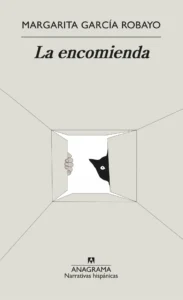The novels and short stories of Margarita García Robayo pull us intimately close to characters she creates through the lens of her own experience. Hasta que pase un huracán (Waiting for a Hurricane), Lo que no aprendí, and La encomienda (The Delivery) are a few of her novels. She has also authored the short story collections Cosas peores (Worse Things, Premio Literario Casa de las Américas, 2014) and Primera persona. Her work has been translated into several languages, and 2018 saw the publication of Fish Soup, translated by Charlotte Coombe, which was included on The Times’ prestigious “Books of the Year” list. I interviewed the author and asked in greater detail about the development of her work.
 |
 |
 |
Eduardo Suárez Fernández-Miranda: “Margarita García Robayo is a sophisticated system of layers… She has elegance, she has narrative treachery. She has a world inside her head, and it’s a complex world, full of sharp corners and contrasts.” Do you identify with these words from Leila Guerriero?
Margarita García Robayo: Above all, I feel honored that she said those things. Because I’m interested in cultivating the qualities she points out in that quote. I’m interested in that narrative pursuit; that thing that’s always much more complex than it seems is what I persistently try to observe, in order to then write it.
E.S.F-M.: In 2014, you won the Premio Literario Casa de las Américas for your book of short stories, Cosas peores. In the prize jury’s decision, they stated, “family collapse and the rupture of emotional ties are addressed as signs of a generalized fracture and a powerful symbol of contemporary solitude.” It has been ten years since then. Do you still see these themes as essential to your work?
M.G.R.: Ten years have passed… Yes, I’m still writing more or less the same thing [laughs]; nothing else has come to me in ten years. I think I’m interested in fractures in families as a metaphor for a society that is full of cracks, of ruptures, of things that don’t work. I think the only reason why I write is because, before the writing process, there is a preoccupation arising from close observation of something I find bothersome, uncomfortable, or violent, something I can’t stop looking at. Then that observation is translated into text, into writing; in that sense, the family is fertile ground, because it’s a structure onto which we can easily map the social defects that most characterize us.
E.S.F-M.: You’re Colombian, and you’ve lived in Buenos Aires since 2005. How has the language you relate to in Argentina influenced your writing? Has your Cartagena accent gradually disappeared from your literature, or do you try to maintain it?
M.G.R.: I really don’t make any effort to choose whether I’m writing in Colombian or Argentinian, because naturally, in life as in writing, what comes out is some kind of hybrid. I’m more interested in literature in which you can detect the author, their gaze, which we might just as well call their fingerprint; that includes, of course, how they speak, the way they use words, how their syntax sounds. In that regard, it really stood out to me, in the latest translation of one of my books into English, that the translator asked me to send all my responses as audio notes. I asked her why, and she said to me, well, it’s to feel your tonality, the way you explain things, how words sound in the author’s mouth, it’s very important to my work, she told me, because I’m translating that too.
E.S.F-M.: Do you think, when a Latin American author is published in Spain, some presses tend to “suggest” that they don’t use certain words so the text will be easier to understand?
M.G.R.: Absolutely. Editors—depending on who they are, logically—propose this transaction all the time: “Well, how about we swap this word for this other one, since a lot of people won’t understand…” And you negotiate. In general, I don’t change much because I’m not writing in slang or some obscure jargon, and for the most part I think, based precisely on what we were just talking about, that texts bear a mark, the author’s mark, and the fact is that words don’t make sense because they belong do a certain country or another; their meanings can easily be found out, or understood from context. I don’t think it adds much to flatten out or whitewash a text’s language. In certain projects, you even generate a specific form of language for the characters of a given story, a given universe, and they speak that way within it, they understand each other, but if you pulled them out into the world they would collapse.
E.S.F-M.: There are texts by Fernanda Melchor, for example, where she uses a variety of Spanish that’s very particular to the area she comes from, Veracruz, and those texts are harder to understand, but if you removed that distinctive language, the work would lose its raison d’être.
M.G.R.: Right, right. In her case—despite being monstrously talented—her overall project as a writer is very strongly linked to that aspect. So it would be absurd to carry out some sort of translation or change because the work would lose its color.
E.S.F-M.: Alegría (Páginas de Espuma, 2024), one of your latest books, forms part of the collection Voces/Literatura 360. Why did you decide to have drawings by Paola Andrea Gaviria, or “Powerpaola,” illustrate your story?
M.G.R.: I’ve been a big fan of hers for many years. The truth is, Alegría is one of those texts I had laying around; it was just a draft, and then Juan Casamayor came and said to me one day, “Might you have something mid-length for this collection?” I was familiar with the collection and I thought it was great, so I said to him, “Let’s try this one. I have no idea if it’ll work or not.” He liked it a lot, we started working on the text, and he asked me specifically who I would like to illustrate it. I told him Powerpaola, firstly because she’s Colombian, I know her drawings, her work, I thought she was ideal. Then, while we were working, I was glad to find out she had a similar memory of something that’s really important in the story: the jungle, the atmosphere of the jungle.
E.S.F-M.: In Alegría, when you talk about the woods, you’re referring to the Colombian rainforest. How do you think your protagonists are influenced by living surrounded by such a powerful natural environment?
M.G.R.: It’s a very strong, almost oppressive presence. Obviously, within the text, it harkens back somewhat to realist narratives, so there is something sinister about it, more threatening than sinister. Just imagine, in Colombia you’re going down the highway and there’s no horizon. The path, the road, goes through the middle of the woods. I remember when I was a little girl we had a little country house just outside Cartagena, and everytime we went there and I looked out the window, I felt as if those woods were like an animal. I used to imagine thousands of things that might happen to me if I went in there, I used to imagine it could swallow me alive.
E.S.F-M: El afuera (Anagrama, 2024) is a biographical text in which you tackle themes of motherhood, family, and writing. The titular “outside” refers to the outside world and its potential dangers. What was the seed from which this book grew?
M.G.R.: It came out of some notes I found in an old notebook. I started looking them over, and I said to myself, “How strange, there’s a pattern here.” I started looking for what these notes meant to me, and there was a fixation on observing everything that’s going wrong out there, a sort of persistent complaint. When I checked the dates on the notes, I realized I had taken them all after becoming a mom. The cities where I’ve lived, all of which are in Latin America, suffer the same condition to a greater or lesser degree: ever more degraded public space, neglect from the state and, consequently, from citizens, who tend to shut themselves in. Before I became a mom, I still noticed it, but it affected me differently. I wanted to tell the story of that middle-class tendency to shut oneself in, to grow inward, with your back toward the outside; and that generates degeneration as a result, making the outside a space of scorn.
E.S.F-M.: In El afuera, we read, “Days later a mother wrote to me: ‘Impostor! I read your book, haha. You seemed like such a good person.’” And, “Every time M. wants to point out a deep crack to me, an irreparable defect, a dark moral hole, she tells me: ‘In the end, you are what you write.’ And she knows that hurts me.” Is that the risk you take as a writer, of being identified with what you write?
M.G.R.: Yes, absolutely. No one is safe from that sort of mistake on the part of some (more than a few) readers, who think you’re a carbon copy of what you write. Nothing could be further from the truth. I feel safe in writing because that’s where I can best disguise myself, despite (or perhaps precisely because of) the fact that these kinds of texts are called “autofiction.” They say this term was coined by the French writer Serge Dubrovsky; when he was asked if he wrote autobiography, he said, “Look, the autobiography is a privilege for important people. What I do is fiction made of strictly real events.” And I do identify with that definition because, besides the fact that the things I write about are “based on reality,” the result is a fiction, a construction.
E.S.F-M.: Alfaguara recently republished your El sonido de las olas (Tres novelas cortas). This volume includes Hasta que pase un huracán, Lo que no aprendí, and Educación sexual (the first and third of which were included in Fish Soup as Waiting for a Hurricane and Sexual Education, respectively). What do the books that make up this set have in common? Do you think there’s a risk of them losing their individuality?
M.G.R.: Those three novels share a physical space, the sea. They are three novels that take place in a city that is unnamed in the text, but whose characteristics make it quite similar to Cartagena, where I was born and raised. That closeness to the sea—the presence of nature, of temperature—determines the behavior of the characters who inhabit that space. My goal was to talk about Colombian Caribbean society with all its pitfalls. And, getting back to the subject of social fragmentation, about families built on all those social vices that are reproduced within their nuclei, while never calling them by their names. That kind of society—which I know very well, which I feel very close to, and, above all, which I’m interested in somehow reading and observing—is what brings the three books together. When I started publishing with Alfaguara a few years ago, they asked me to reclaim the rights to those books and put them together in a single volume, and I thought it was a good idea economically, in more ways than one, but also on the most elementary level: instead of buying three novels, you buy one. The decision was more editorial than it was literary.
E.S.F-M.: The main character of Hasta que pase un huracán struggles to leave behind her city, which she hates, because it is “both really beautiful and really ugly” and she is “somewhere in the middle.” At the end of the novel, her “self-awareness” disappears, at that’s when all is “lost.” When you finish a novel, do you think about what the future might hold for its characters?
M.G.R.: [Laughs] Yes, sometimes. I think about what might have become of the character if I hadn’t left them in such an abyss. Sometimes, when I’m writing, I remember a movie I saw when I was really little—I don’t know if it came out here—called Clash of the Titans. In the movie, the god Zeus has a kind of diorama that represents the world, and he moves the characters around with his hands and says, “Now this is going to happen to you.” He manipulates people’s fates on a whim, they’re his toys. And that’s what I think about, how you create characters who seem to have their own lives, stories, fates, and pasts, and you spend a long time with them, then you abandon and forget them.
E.S.F-M.: In La encomienda (Anagrama, 2022; translated by Megan McDowell as The Delivery), as is typical of your writing, we enter into the intimate lives of the characters. In this case, the main character, a young publicist, is met with a two-sided surprise: a huge box her sister sends her (the delivery) and a visit from her somewhat ghostly mother. You create an unsettling atmosphere, where the neighbors, this park near the building might become menacing…
M.G.R.: In that novel, what was really going on was the least of my concerns. All of that had to stay in a gray area. I wanted La encomienda to work like that past you thought you got rid of, that you shrugged off when you left the place you come from. But one day you realize you can’t leave the past behind, your ghosts are your memory and they’ll follow you wherever you go. I wanted to play with that sensation in La encomienda—someone who feels so free, so independent, so aloof, and then suddenly comes up against “a ghost” or their past, their origin, or their flesh-and-blood mother, either way, and who has to contend with something they thought was no longer a part of their life.
E.S.F-M.: When your book Tiempo muerto (Alfaguara, 2017; translated by Charlotte Coombe as Holiday Heart) was published, Juan Cárdenas said, “García Robayo has built one of the most solid and interesting bodies of work in Latin American literature.” We don’t talk about Colombian, Argentinian, or Mexican literature the way we talk about Spanish, English, or German literature. What are the points of connection between the literature produced in different Latin American countries that justify talking about it as a whole?
M.G.R.: It’s true, little is said about the literature of any given Latin American country. I think that’s a mistake, a deceitful abstraction. It’s as if we were looking at ourselves from the outside, just like we complain of others looking at us. Latin America is huge, it’s not all in a single key. I do think there’s one factor, now I’m thinking of it: we Latin American writers move a great deal from country to country, we traverse this geographical space in a way, bringing it together. I sometimes think the task of being a writer brings with it the need to leave a place in order to distance yourself and then finally look back at it with greater clarity. But the curious part is, even when we leave our places of origin, we end up writing about the same places. I’m rambling, but what you said is true and I don’t have a clear answer. Historically, Latin America has been seen as a whole, as a unit, and I think that’s an erroneous reading. There should be a more singular focus on each country.
E.S.F-M.: Lastly, I’d like to ask if you have any future projects in mind.
M.G.R.: Yes, for sure. I’m working on what you might call a novel—that’s the word the publishers like—so yes, I’m working on what’s still very much a fledgling novel. I haven’t written much yet, but I’m cooking it up gradually in my head. I think, when I sit down to write, I’ll have it figured out clearly enough. I’m not yet quite sure how to explain it, but I’ll get there.



